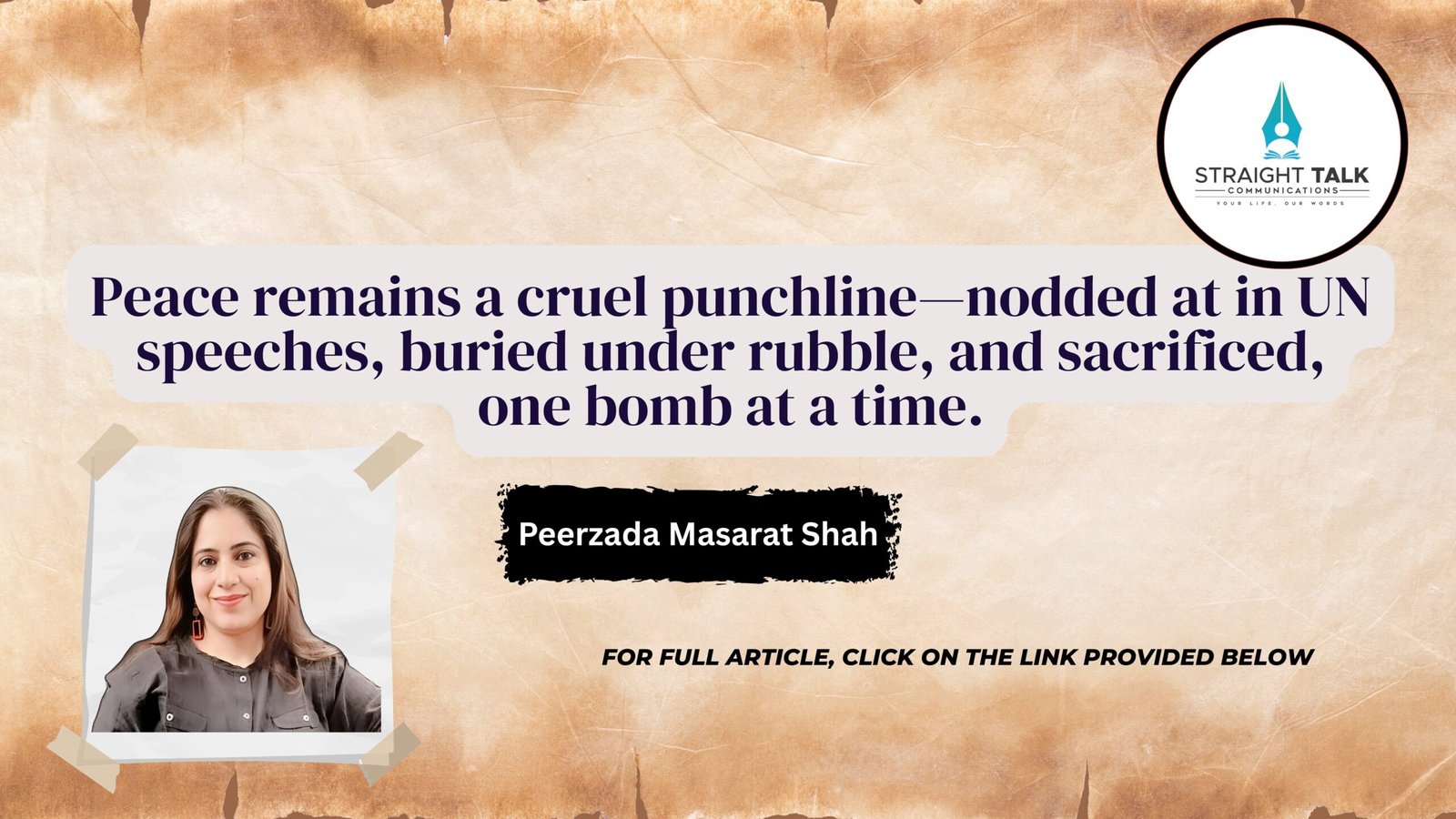Middle East Peacekeeping: One Bomb at a Time

Peace remains a cruel punchline—nodded at in UN speeches, buried under rubble, and sacrificed, one bomb at a time.
Peerzada Masarat Shah
The Middle East, a land scorched by decades of conflict, shifting alliances, and foreign meddling, reels from yet another act of aggression. On June 12, 2025, Israel reportedly launched airstrikes on strategic Iranian targets—military bases and suspected nuclear facilities—pushing the region to the brink of all-out war. This isn’t just another flare-up; it’s a spark that could ignite a regional catastrophe with global consequences.
Details are murky, shrouded in censorship and propaganda from both sides. Reports from Reuters and Al Jazeera, citing anonymous officials, confirm strikes on Iran’s air defense systems near Isfahan and a Revolutionary Guard base in Qom. Tehran vows retaliation, with state media quoting Supreme Leader Khamenei: “The Zionist regime will pay a heavy price.” Israel, citing “preemptive self-defense,” remains unapologetic. The world watches, half-numb, half-braced for chaos.
A Region in Endless Turmoil
The Middle East is a cauldron that never cools. From Gaza’s rubble to Syria’s ruins, Lebanon’s fragility to Yemen’s famine, the cycle is relentless: ceasefires collapse, peace talks stall, and civilians pay the price. Israel’s doctrine of “preemptive defense” is a euphemism for striking first and shaping the narrative later. But this time, hitting Iran directly risks a wider war. Iran, backed by Hezbollah, Syria, and growing ties with Russia and China, may not opt for restraint. Posts on X reflect the tension: “#IranUnderAttack trending with 1.2M posts. Videos of explosions near Tehran are circulating, but no one trusts the sources,” one user noted. Another wrote, “Israel’s playing with fire, and we’re all going to burn.”
Civilians, as always, are caught in the crossfire. In Tehran, families brace for reprisals; in Tel Aviv, bomb shelters are reopened. The human toll—displacement, trauma, death—mounts while leaders posture.
Global Hypocrisy Laid Bare
The Western media’s double standards are glaring. Israeli strikes are framed as “strategic defense”; Iranian responses, if they come, will be branded “terrorism.” A BBC headline reads, “Israel Targets Iranian Threats,” while a hypothetical Iranian counterstrike would likely be “Iran’s Dangerous Escalation.” The UN, true to form, issued a tepid call for “restraint on all sides,” as if Iran invited the bombs. The U.S., meanwhile, pledges $3.5 billion in additional military aid to Israel, per a June 13 Pentagon statement, “to ensure its qualitative edge.”
X users aren’t buying the spin. One post with 45K likes reads: “When Ukraine’s borders are sacred, it’s ‘international law.’ When it’s Gaza or Iran, it’s ‘complex.’ Hypocrisy much? #MiddleEast” Another user, a Palestinian activist with 200K followers, posted: “The West funds Israel’s bombs but cries for peace. Where’s the justice? #GazaGenocide.” The public mood on X is a mix of outrage, cynicism, and fear—many see this as a prelude to a broader conflict.
A Regional Time Bomb
A direct Israel-Iran clash isn’t just bilateral—it’s a domino effect waiting to happen. Hezbollah could escalate in Lebanon, where skirmishes along the border are already intensifying, per a June 14 Al Monitor report. Syria, a fractured proxy battleground, risks becoming a missile corridor. Iraq’s militias, aligned with Iran, are mobilizing, with one commander tweeting: “Zionist aggression will face our wrath. #Resistance.” The Gulf States, balancing trade with Iran and normalization with Israel, face a diplomatic tightrope. Oil prices spiked 4% overnight, per Bloomberg, but the real cost will be human: refugees, radicalization, and another generation lost to war.
Arab Silence, Civilian Screams
Arab regimes, once vocal defenders of the Muslim world, are conspicuously quiet. Saudi Arabia and the UAE, distracted by economic diversification and global optics, issue vague statements about “stability.” Egypt grapples with its own crises; Jordan plays Western intermediary. On X, the sentiment is scathing: “Where’s the Ummah? Gulf kings sip coffee while Palestine and Iran burn,” one user posted, garnering 30K retweets. Another wrote, “Arab leaders sold out. Only the people still care. #FreePalestine.” The roar comes from the innocents—children buried in Gaza’s rubble, mothers grieving in Tehran’s hospitals, youth crushed by collapsing economies.
The Mirage of “Security”
Israel’s justification—security—rings hollow. Can security be built on occupation and airstrikes? Each “preemptive” strike breeds the violence it claims to prevent. This isn’t defense; it’s a cycle of provocation and retaliation, dragging the region closer to the abyss. On X, a Lebanese user summed it up: “Israel bombs Iran, Iran hits back, Hezbollah joins, and we’re all collateral damage. When does it end?”
A Prayer Amid the Chaos
As smoke rises and fear grips the region, deeper questions loom. Is endless war the Middle East’s fate? Are borders worth more than lives? Is domination stronger than peace? Muslims worldwide pray, “Ya Allah, save us,” but those prayers compete with the drone of warplanes. Peace remains a cruel punchline—nodded at in UN speeches, buried under rubble, and sacrificed, one bomb at a time.







